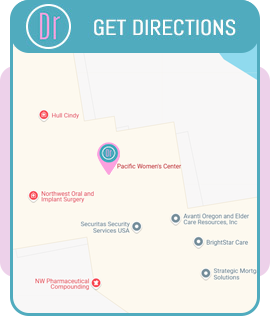PMS (Premenstrual Syndrome) Treatment Specialist in Eugene, OR
The signs and symptoms of PMS are diverse, and individuals may experience some symptoms and not others. Typically, these symptoms emerge before menstruation and can be both physical and emotional. Dr. Richard Beyerlein MD, CPI, FACOG, and Tamara A. Stenshoel, MD, FACOG are dedicated to developing personalized strategies to alleviate PMS symptoms and enhance the quality of life for our patients. To learn more about the Premenstrual Syndrome Treatment, contact us or schedule an appointment online. We are conveniently located at 911 Country Club Rd Suite 222, Eugene, OR 97401.


Table of Contents:
What causes premenstrual syndrome?
At what age does PMS start?
What are the signs and symptoms of premenstrual syndrome?
How long does Premenstrual syndrome (PMS) last?
Premenstrual Syndrome (PMS) encompasses a wide array of signs and symptoms that women may experience approximately a week or two before their menstrual period begins. It is quite common among women, yet the exact cause of PMS remains unclear.
However, several potential contributing factors have been identified. One primary factor is hormonal fluctuations which accompany the menstrual cycle and are believed to be linked to the signs and symptoms of PMS.
Changes in brain chemistry, particularly fluctuations of serotonin, a neurotransmitter known to contribute to mood, are also thought to correlate with PMS symptoms. Insufficient levels of serotonin may lead to fatigue, sleep problems, food cravings, and premenstrual depression.
Additionally, mental health conditions like depression may be more prevalent among women with severe PMS, though these conditions alone do not account for all the symptoms experienced.
Other risk factors for the onset include family history, women whose mothers experienced PMS are more likely to as well, and pregnancy history with some studies suggesting PMS symptoms are more common among women who have never been pregnant.
The varying potential causes of PMS mean there is no one-size-fits-all treatment option. Instead GYNs such as Dr. Richard Beyerlein, MD work with women on an individual basis to address the underlying causes or treat the symptoms associated with PMS as is necessary.
There is no set age for the onset of PMS as it can present at any time during a woman’s childbearing years. Generally, symptoms may appear at any point between puberty and menopause, but they most commonly begin for women in their late 20s or early 30s.
As women age, PMS can sometimes worsen, and this deterioration may be influenced by factors such as stress and lifestyle, especially if the underlying causes of PMS are not addressed or treated.
Notably, family history plays a role, with women more likely to experience PMS if their mother also had PMS. Studies also suggest that women who have not given birth may be more likely to experience PMS.
The signs and symptoms of PMS are diverse, and individuals may experience some symptoms and not others. Typically, these symptoms emerge before menstruation and can be both physical and emotional. Common physical symptoms include cramps, breast tenderness, headaches, and acne flare-ups. On the emotional front, women may feel anxious, sad, or depressed, experience changes in sex drive, appetite, and sleeping patterns, have difficulty concentrating, and notice fluctuations in their energy levels.
The severity of these symptoms varies among women. While most women do experience some form of PMS, it generally does not disrupt their daily lives. However, for some, the symptoms can be quite severe, leading them to withdraw socially and self-isolate.
The duration of PMS varies on a case-by-case basis but typically lasts only a few days. Symptoms usually present one to two weeks before menstruation, starting approximately five days before and alleviating within the first four days after the onset of bleeding.
Depending on the severity and presentation of symptoms, some women may seek treatment from PMS specialists, especially if the symptoms are long-lasting or severe enough to interfere with daily life. It is important to note that PMS symptoms can sometimes signal underlying health conditions that require attention and treatment.
There is no universal treatment for PMS, but a tailored approach established in consultation with an OBGYN can effectively manage specific symptoms or address the underlying causes of severe PMS. This personalized approach helps individuals take control of their symptoms and improve their overall well-being.
Premenstrual syndrome (PMS) treatment is available at Pacific Women’s Center. To learn more about the Premenstrual Syndrome Treatment, contact us or schedule an appointment online. We are conveniently located at 911 Country Club Rd Suite 222, Eugene, OR 97401. We serve patients from Eugene OR, Springfield OR, Creswell OR, Lowell OR, Cottage Grove OR, Coburg OR, Junction City OR and the surrounding areas.

ADDITIONAL SERVICES YOU MAY NEED
❱ Abdominal Hysterectomy
❱ Bladder Lift Surgeon Q&A
❱ Cervical Cone Biopsy
❱ Colposcopy
❱ Endometrial Ablation
❱ Endometrial Biopsy
❱ Female Sexual Dysfunction
❱ Gynecological Surgery
❱ Gynecology
❱ Hormone Therapy
❱ Vaginal Hysterectomy
❱ Endometriosis Diagnosis & Care



